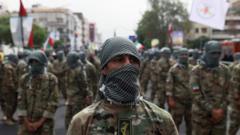An important milestone has emerged in Israel’s long quest to recover the legacy of Eli Cohen, one of its most celebrated spies who was executed in Syria in 1965. Israeli intelligence services, with assistance from an unnamed foreign ally, have successfully returned 2,500 personal items belonging to Cohen, including identity documents, photographs, and personal letters. The Israeli Prime Minister's Office made the announcement, speculating that these items could bring greater insight into Cohen’s impact during his undercover operations in Syria.
Recovery of Eli Cohen's Documents Marks Progress in Israel's Historic Espionage Efforts

Recovery of Eli Cohen's Documents Marks Progress in Israel's Historic Espionage Efforts
Israeli officials celebrate the recovery of crucial documents belonging to renowned spy Eli Cohen, shining light on his significant contributions to intelligence during the 1960s.
Cohen infiltrated the highest echelons of Syrian leadership in the early 1960s, gathering indispensable intelligence that played a pivotal role in Israel's military success during the 1967 Arab-Israeli War. Despite the enduring difficulty in retrieving Cohen’s remains, this recent development indicates a notable advance in uncovering the history and significance of his espionage work. Underlying this recovery is Cohen’s deep-rooted impact on Israeli security, which resonates to this day, especially considering the vital information he provided regarding Syria's military dynamics and alliances.
As the Israeli government continues its efforts to honor Cohen's memory, the recent assortment of documents stands as a testament to the enduring legacy of espionage and the complexities surrounding international relations in the Middle East. While questions remain about the retrieval process and the documents' exact origins, this event significantly boosts hopes for a more comprehensive understanding of Cohen’s legacy in Israeli history.
As the Israeli government continues its efforts to honor Cohen's memory, the recent assortment of documents stands as a testament to the enduring legacy of espionage and the complexities surrounding international relations in the Middle East. While questions remain about the retrieval process and the documents' exact origins, this event significantly boosts hopes for a more comprehensive understanding of Cohen’s legacy in Israeli history.





















